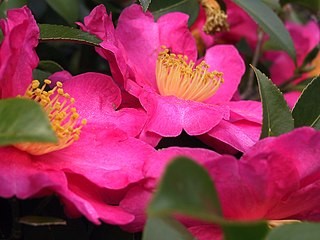
Camellia is a genus of flowering plants in the family Theaceae. They are found in eastern and southern Asia, from the Himalayas east to Japan and Indonesia. There are 100–300 described species, with some controversy over the exact number. There are also around 3,000 hybrids. The genus was named by Linnaeus after the Jesuit botanist Georg Joseph Kamel, who worked in the Philippines and described a species of camellia. Camellias are famous throughout East Asia; they are known as cháhuā in Chinese, tsubaki (椿) in Japanese, dongbaek-kkot (동백꽃) in Korean, and as hoa trà or hoa chè in Vietnamese.
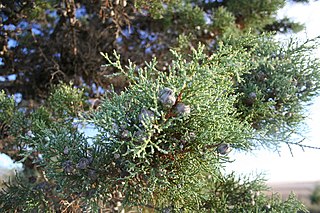
Cypress is a common name for various coniferous trees or shrubs of northern temperate regions that belong to the family Cupressaceae. The word cypress is derived from Old French cipres, which was imported from Latin cypressus, the latinisation of the Greek κυπάρισσος (kyparissos).

Castanopsis, commonly called chinquapin or chinkapin, is a genus of evergreen trees belonging to the beech family, Fagaceae. The genus contains about 120 species, which are today restricted to tropical and subtropical eastern Asia. A total of 58 species are native to China, with 30 endemic; the other species occur further south, through Indochina to Indonesia, mountainous areas of Taiwan, and also in Japan. The English name chinkapin is shared with other related plants, including the golden chinkapins of the Pacific United States, which are sometimes included within Castanopsis but are more often considered a separate but very closely related genus, Chrysolepis.

Castanopsis cuspidata is a species of Castanopsis native to southern Japan and southern Korea.

Olea europaea subsp. cuspidata is a subspecies of olive previously described as Olea cuspidata and Olea africana. It has various common names, including wild olive, brown olive, Indian olive, Olienhout and iron tree.

Laportea is a genus of plants in the family Urticaceae.
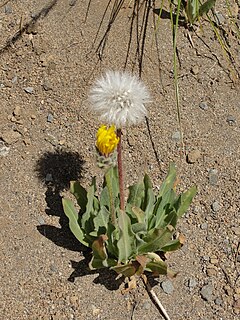
Agoseris is a small genus of annual or perennial herbs in the Asteraceae or sunflower family described as a genus in 1817.
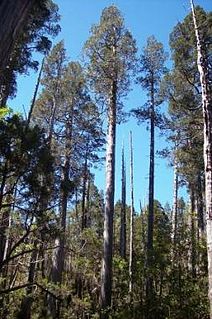
The Antarctic Floristic Kingdom, also the Holantarctic Kingdom, is a floristic kingdom that includes most areas of the world south of 40°S latitude. It was first identified by botanist Ronald Good, and later by Armen Takhtajan. The Antarctic Floristic Kingdom is a classification in phytogeography, different from the Antarctic ecozone classification in biogeography, and from Antarctic flora genera/species classifications in botany.
Salvia cuspidata is a perennial shrub native to the Andes mountains in Bolivia, Chile, and Peru, growing at elevations up to 10,000 ft (3,000 m).

Chorizanthe cuspidata is a species of flowering plant in the buckwheat family known by the common name San Francisco spineflower. It is endemic to California, where it is known only from the San Francisco Bay Area and to the immediate north and south. It grows in sandy coastal habitat.
The Casas de Los Pinos Solar Power Plant is a 10 MW photovoltaic power station in Castile-La Mancha, Spain. The facility was commissioned in November 2007, and was developed by Renovalia Solar SL. The plant consists of 120 Solaria and Suntech units of 100 kW, with a total of 69,850 photovoltaic panels.
Vossia is a genus of Asian and African plants in the grass family.
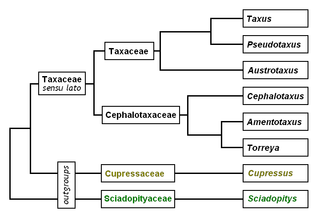
Yew is a common name given to various species of trees.
Pierfelice Ravenna is a Chilean botanist of Italian Jewish origin. His research interests are mainly in the field of South American Amaryllidaceae.

Solaria is a genus of South American plants in the Amaryllis family, subfamily Allioideae, tribe Gilliesieae, native to Chile and Argentina.

Gilliesieae is a tribe of herbaceous geophyte plants belonging to the subfamily Allioideae of the Amaryllis family (Amaryllidaceae). Described in 1826, it contains fifteen genera and about eighty species. It has been variously treated as a subfamily or tribe. It is native to the Southern United States, Central and South America, predominantly Chile. Of the three tribes of genera that make up the subfamily Allioideae, Gilliesieae is the largest and most variable. The tribe was divided into two tribes in 2014, Gilliesiae s.s. and Leucocoryneae, based on differences in floral symmetry and septal nectaries.

Poa cuspidata, commonly called early bluegrass, is a species of flowering plant in the grass family (Poaceae). It is native to the eastern United States, where its range extends from Appalachian regions into the Coastal Plain, where it is less common. In the Appalachian mountains, it is a common species found in forest openings.
Excoecaria cuspidata is a species of flowering plant in the family Euphorbiaceae. It was originally described as Excoecaria hialayensis var. cuspidataMüll.Arg. It is native to China and Meghalaya, India.
Eucalyptus cuspidata is a species of small, spreading mallee that is native to the south-west of Western Australia.













